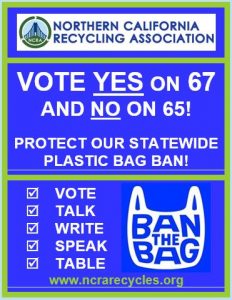MOORE’S MUSINGS
A semi-monthly feature, exclusive to NCRA News, from NCRA general counsel and board member John Moore, concerning recent legal decisions relating in some manner to Zero Waste.
AN ABBREVIATED GUIDE TO ANTITRUST LAW
By John D. Moore, NCRA Vice President and Legal Counsel, Henn, Etzel & Moore, Inc.
At the April meeting of the NCRA Board, member Gary Liss reported via phone about the G7 Alliance On Resource Efficiency Workshop he attended in Washington DC in March, partially through aid from NCRA. Mr. Liss reported that representatives of competing Japanese auto parts manufacturers expressed concern about being accused of violating antitrust laws if they worked together towards Zero Waste goals like standardization of the design, measurement, and packaging of auto parts. At the conclusion of his report, several NCRA members including some Board members expressed surprise and concern that US antitrust law could be an impediment to US Zero Waste goals. This article is meant to explain the antitrust law concerns.
I have defended businesses accused of violating antitrust law. I do not pretend to be an expert but I know the general parameters of antitrust law. One thing I know for certain is that it is expensive to defend an antitrust law claim. Besides proving that the claimed conduct violates antitrust law, the plaintiff must prove its effect on the market and that it has suffered “antitrust injury” under laws that protect competition but not competitors. The litigated fight often is about the scope of the market of the product involved and the defendants’ conduct to suppress competition in that market. The defendant wants the court to define the market broadly to dilute any claimed impact on that market. The plaintiff has the opposite vantage. One antitrust specialist advised me that the fees of the expert economist hired to answer questions about the market and impact on that market often run “into seven figures.” That is a big pill for many businesses to swallow.
The primary antitrust law is the federal Sherman Antitrust Act, named for Senator John Sherman (brother of Gen. William T. Sherman) who is said to have never read the law that bears his name. When the law was passed in 1890, business cartels were referred to and organized as “trusts”. The basic command of the Sherman Act is that any combination or conspiracy (agreement) that restrains trade violates the law. The Sherman Act also prohibits monopolies. The application of this prohibition to the many anti-competitive actions a business may take has spawned additional federal statutes such as the Clayton Act and Robinson-Patman Act, and California’s Cartwright Act and Unfair Practices Act, and scores of federal and state case law precedents. The Supreme Court held that “The purpose of the Sherman Act is not to protect businesses from the working of the market; it is to protect the public from the failure of the market. The law directs itself not against conduct which is competitive, even severely so, but against conduct which unfairly tends to destroy competition itself.”
The result of all this shaping of antitrust law starting with the Sherman Act is a pretty clear and seldom changing way to examine anti-competition claims. First, there are a species of claimed violation called “per se” violations. Per se violations are anticompetitive actions that are so evil that they can never be justified consistently with fair competition. A plaintiff need only prove that the per se conduct occurred to prove its case. The traditional per se violations are monopolization, price fixing, horizontal (all conspirators in the same channel such as wholesale, retail etc) agreements to divide customers or to boycott certain customers, and tying agreements (conditioning the purchase of one product upon the purchase of a different product or service). But even within each of these categories, Courts have carved out exceptions. For 98 years agreements to maintain resale pricing were judged on the per se rule. In 2007 the US Supreme Court changed that rule. Courts have held states to be immune from antitrust liability and courts have extended this protection to local governments that are carrying out a “clearly articulated” state policy. This is the source of antitrust immunity enjoyed by exclusive franchise agreements.
The second category of antitrust law violations is a residual category. Any anticompetitive practice that is not a per se violation is judged by how reasonable and/or pro-competitive it is for the business to use the practice. This is called a “rule of reason.” So antitrust laws fall into either the per se or rule of reason categories. A good example in applying the rule of reason is a vertical (parties in different channels) restraint for a manufacturer to set wholesale prices and conditions on a different basis between internet vendors and brick and mortar retailers. The manufacturer usually relies on the retailer to promote the products and educate customers in the target market about the product. This promotion has a cost to the retailer. Internet sellers, in contrast, do little for product promotion and instead compete on price. A person buying a television might browse and get product advice from a brick and mortar store or chain and then order the desired product from an online seller that undercuts the brick and mortar store on price. The vertical price restraint favoring brick and mortar sellers is judged by this so-called rule of reason. The manufacturer will argue that since it reaches its market through brick and mortar stores and the more that is known about a product the more competition there is for customers, applying the rule of reason to discriminatory pricing to internet vendors, results in a finding of no antitrust liability. The rule of reason also requires the plaintiff to prove that the anticompetitive conduct affect a significant percentage of the defined market. But all this happens after the defendant business pays millions of dollars to defend itself, the cost of which is, of course, passed on to product buyers via increased pricing.
One truism of antitrust law is there is seldom direct evidence of a conspiracy. It is rare to have evidence of two or more people agreeing to anticompetitive conduct. The discussion in a restaurant between co-conspirators that results in an action that violates antitrust law is not usually heard except by the co-conspirators themselves and there is unlikely to be a later confirming written record of the conversation that took place. So, unless one of the conspirators snitches on the others, courts rely upon circumstantial evidence (actions from which the existence of a fact may be inferred) to prove antitrust law violation. (Thoreau observed that “Some circumstantial evidence is very strong, as when you find a trout in the milk.”)In antitrust law courts are willing to allow circumstantial evidence that parties “acted” like there was an illegal agreement even though there was no other evidence of an agreement to violate antitrust law. This is called “conscious parallelism”.
So, circling back to the auto parts makers: If you attend a trade group meeting attended by competitors, it is common for the moderator to remind the audience that “we are not here to fix prices or violate antitrust laws.” Regardless of the caution given, any discussion between competitors could be viewed in hindsight as an agreement to restrain trade if there is later market impact. So no matter how “progressive toward a Zero Waste goal” if two competing businesses reach consensus that has a market impact they might find themselves defending an antitrust lawsuit. So I did not find it unreasonable for the competitors attending the Zero Waste Business Council to be reluctant to cooperate towards Zero Waste goals.
The opinions expressed are only of the author. This article contains general information about legal matters. The information is not advice, and should not be treated as such.



